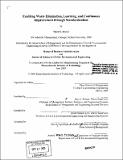Enabling waste elimination, learning, and continuous improvement through standardization
Author(s)
Stover, Mark E. (Mark Eugene)
DownloadFull printable version (22.86Mb)
Other Contributors
Leaders for Manufacturing Program.
Advisor
Roy E. Welsch and David Simchi-Levi.
Terms of use
Metadata
Show full item recordAbstract
Many manufacturing companies have developed their own operating system, usually based upon the Toyota Production System, in an effort to improve productivity, quality, and profitability. Continuous improvement is a central theme to most operating systems. Typically large continuous improvement projects or kaizen bursts are used to improve processes. However, these often lead to variable and unsustainable results. A hypothesis is that a detailed standardization of processes will enable opportunities to be quickly revealed. Then a focus on incremental improvement through experimentation can lead to dramatic sustainable results. This thesis is based upon my experience at Mighty Motors in an attempt to gain a deeper understanding about standardization and continuous improvement. I obtained this understanding through direct observation by working with operators on the assembly line to standardize the process and make improvements. I developed the following conclusions: Focus on standardization to achieve sustainable continuous improvement. Without standardization, randomness and variability will hide the wastes and improvements will deteriorate. (cont.) Value the incremental improvement approach to continuous improvement. Through simple, common-sense, and low cost experimentation a great deal of process improvements can be made. Creating an organization that values standardization and continuous improvement is the hard part. This involves more than using a set of problem solving tools.
Description
Thesis (M.B.A.)--Massachusetts Institute of Technology, Sloan School of Management; and, (S.M.)--Massachusetts Institute of Technology, Dept. of Civil and Environmental Engineering; in conjunction with the Leaders for Manufacturing Program at MIT, 2005. Includes bibliographical references (leaf 92).
Date issued
2005Department
Leaders for Manufacturing Program at MIT; Massachusetts Institute of Technology. Department of Civil and Environmental Engineering; Sloan School of ManagementPublisher
Massachusetts Institute of Technology
Keywords
Sloan School of Management., Civil and Environmental Engineering., Leaders for Manufacturing Program.